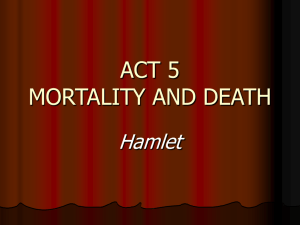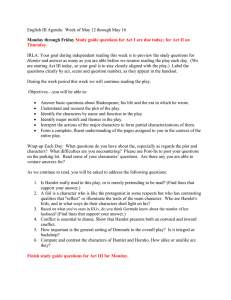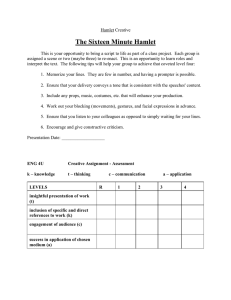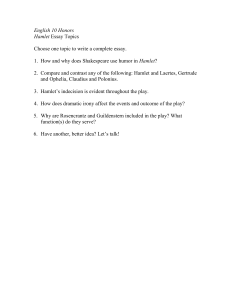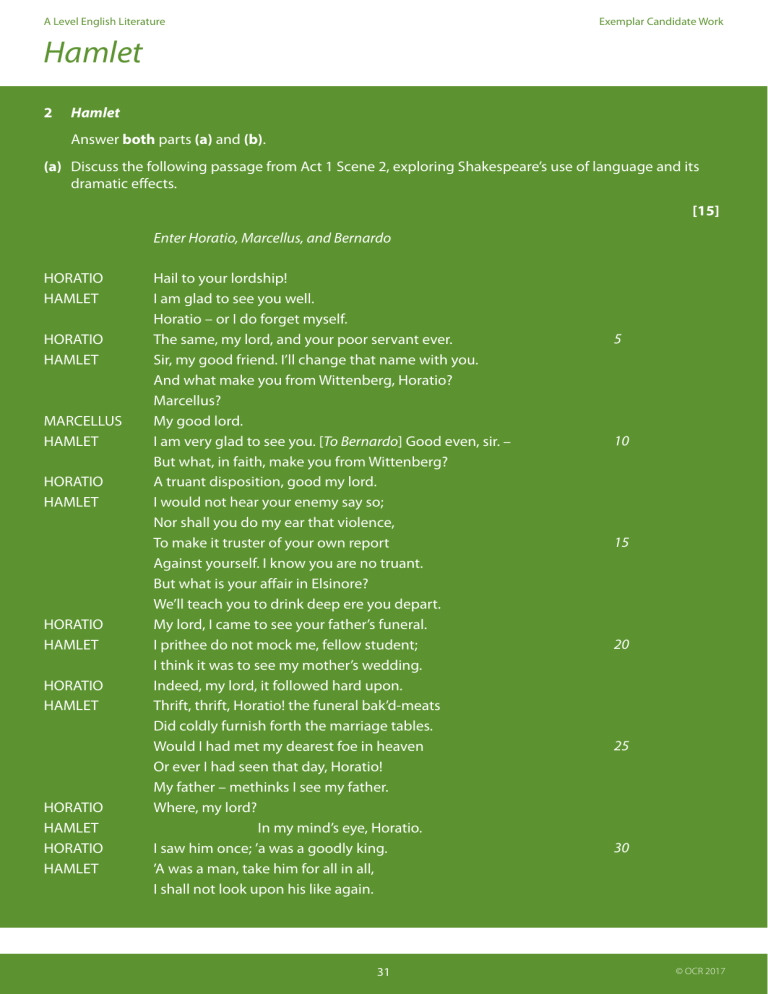
A Level English Literature Exemplar Candidate Work Hamlet 2 Hamlet Answer both parts (a) and (b). (a) Discuss the following passage from Act 1 Scene 2, exploring Shakespeare’s use of language and its dramatic effects. [15] Enter Horatio, Marcellus, and Bernardo HORATIO HAMLET Hail to your lordship! I am glad to see you well. Horatio – or I do forget myself. HORATIO The same, my lord, and your poor servant ever. HAMLET Sir, my good friend. I’ll change that name with you. And what make you from Wittenberg, Horatio? Marcellus? MARCELLUS My good lord. HAMLET I am very glad to see you. [To Bernardo] Good even, sir. – But what, in faith, make you from Wittenberg? HORATIO A truant disposition, good my lord. HAMLET I would not hear your enemy say so; Nor shall you do my ear that violence, To make it truster of your own report Against yourself. I know you are no truant. But what is your affair in Elsinore? We’ll teach you to drink deep ere you depart. HORATIO My lord, I came to see your father’s funeral. HAMLET I prithee do not mock me, fellow student; I think it was to see my mother’s wedding. HORATIO Indeed, my lord, it followed hard upon. HAMLET Thrift, thrift, Horatio! the funeral bak’d-meats Did coldly furnish forth the marriage tables. Would I had met my dearest foe in heaven Or ever I had seen that day, Horatio! My father – methinks I see my father. HORATIO Where, my lord? HAMLET In my mind’s eye, Horatio. HORATIO I saw him once; ’a was a goodly king. HAMLET ’A was a man, take him for all in all, I shall not look upon his like again. 31 5 10 15 20 25 30 © OCR 2017 A Level English Literature Exemplar Candidate Work HORATIO My lord, I think I saw him yester-night. HAMLET Saw who? HORATIO My lord, the King your father. HAMLET The King my father! HORATIO Season your admiration for a while With an attent ear, till I may deliver, Upon the witness of these gentlemen, This marvel to you. HAMLET For God’s love, let me hear. HORATIO Two nights together had these gentlemen, Marcellus and Bernardo, on their watch, In the dead waste and middle of the night, Been thus encount’red. A figure like your father, Armed at point exactly, cap-a-pe, Appears before them, and with solemn march Goes slow and stately by them; thrice he walk’d By their oppress’d and fear-surprised eyes, Within his truncheon’s length; whilst they, distill’d Almost to jelly with the act of fear, Stand dumb and speak not to him. This to me In dreadful secrecy impart they did; And I with them the third night kept the watch; Where, as they had delivered, both in time, Form of the thing, each word made true and good, The apparition comes. I knew your father; These hands are not more like. 32 35 40 45 50 55 © OCR 2017 A Level English Literature Exemplar Candidate Work Question 2(a) - Level 6 response - 14 marks 33 © OCR 2017 A Level English Literature Exemplar Candidate Work 34 © OCR 2017 A Level English Literature Exemplar Candidate Work 35 © OCR 2017 A Level English Literature Exemplar Candidate Work Examiner commentary This is a very good answer indeed – with some ‘excellent’ qualities. The answer is difficult to read at times – although this will not have affected the assessment of the essay. The response is of substantial length. Very effective use is made in the answer of technical terminology (including “ominous tone”, hyperbole, repetition and foreshadowing) to support some sophisticated analysis of the linguistic and dramatic effects being used in the passage. Reference to Shakespeare’s “use of punctuation marks” and “hyperbolic punctuation” is – by contrast – a less helpful aspect of the answer and one of the features which prevents the essay from receiving the top mark in the Level. (Level 6; 14 marks) 36 © OCR 2017 A Level English Literature Exemplar Candidate Work Hamlet 2 Hamlet (b) ‘The play Hamlet shows a disturbing fascination with death.’ Using your knowledge of the play as a whole, show how far you agree with this view of Hamlet. Remember to support your answer with reference to different interpretations. [15] Question 2(b) - Level 6 response - 14 marks 37 © OCR 2017 A Level English Literature Exemplar Candidate Work 38 © OCR 2017 A Level English Literature Exemplar Candidate Work 39 © OCR 2017 A Level English Literature Exemplar Candidate Work Examiner commentary Once again this is a very good answer indeed – with some ‘excellent’ qualities. This answer is also difficult to read at times – although once again this will not have affected the assessment of the essay. The candidate chose to answer this part of the paper first – a perfectly legitimate approach. There is impressive focus throughout on aspects of interpretation and on critical views (with reference made to Alexander, “18th century” and “20th century” critics, Bacon and Paul Carter). The synthesis of these into a sophisticated argument is generally impressive but – together with some minor lapses in the quality of written expression – some slight limitations in this area once again hold the answer back from gaining the very highest mark in the Level. (Level 6; 14 marks) 40 © OCR 2017 A Level English Literature Exemplar Candidate Work Hamlet 2 Hamlet Answer both parts (a) and (b). (a) Discuss the following passage from Act 1 Scene 2, exploring Shakespeare’s use of language and its dramatic effects. [15] See page 31 for the full passage. Question 2(a) - Level 6 response - 13 marks 41 © OCR 2017 A Level English Literature Exemplar Candidate Work Examiner commentary This is an answer of some excellence – expressed in a single paragraph. There is a ‘borderline’ quality to the answer: it has qualities of both Level 6 and Level 5. The detailed focus on linguistic and dramatic analysis throughout is impressive. This approach is well-developed and textual references are both critically addressed and blended into the discussion. Perhaps unusually, the focus on dramatic effects achieved in the passage is particularly strong (“dramatic tension”, “dramatic irony”, “contemporary audiences”) and this is one of the elements which makes the answer impressive. At times, the slips made in the expression of ideas are significant: “vendeta”, “deaceased” and “innitial” all appear in the final lines of the answer, for example. (Level 6; 13 marks) 42 © OCR 2017 A Level English Literature Exemplar Candidate Work Hamlet 2 Hamlet (b) ‘The play Hamlet shows a disturbing fascination with death.’ Using your knowledge of the play as a whole, show how far you agree with this view of Hamlet. Remember to support your answer with reference to different interpretations. [15] Question 2(b) - Level 6 response - 13 marks 43 © OCR 2017 A Level English Literature Exemplar Candidate Work Examiner commentary This is another ‘borderline’ answer – very good with some signs of ‘excellence’. A more conventional approach to paragraphing is apparent in this answer although the response is not without failings in the expression of ideas (“dupicitious”; “Lawrence Olivier”). Focus on the topic of death is impressive throughout and the candidate keeps a close eye on the requirements of the jointly-dominant AO5 in his repeated exploration of critical views and interpretations (including reference to Zeffirelli and to the 1948 film version). A mark at a higher point in the top Level would be inappropriate but this is nonetheless an impressive response. (Level 6; 13 marks) 44 © OCR 2017
